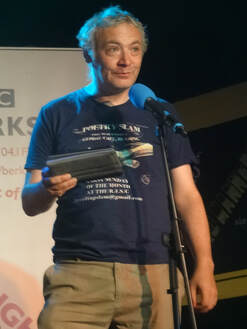|
Endurance for humanity ‘’A day without food is a wasted day’’ Said the boy in a war torn refugee camp But have you ruminated On life without a farmer, food transporters, donors Agriculture educators, food banks, processors and distributors Again, have you imagined life without Food and Agriculture Organization, World Food Programme And the Capital Area Food Bank with their partners ‘’Yes, I have’’ Then what do you have to tell about that life ‘’You will never know that a madman on the street has brothers Until you kill him! I see one billion people left with no jobs Isn’t that about 28% of the world population I see rampant deaths due to hunger and starvation’’ What else do you see ‘’Malnutrition, diseases and stunted growth in children Delayed delivery of the scanty available food I see many economies collapsing I see extreme poverty and food poisoning due to aflatoxins’’ All the holy books, whether the Christian bible, the Hindu Gita, The Moslem Quran and the Buddhism scriptures Are unanimous in one thing, that growing and sharing food is a good thing With their humility like that of the carpenter of Nazareth, Even in the covid 19 pandemic! Fruits, legumes, vegetables, tubers, grains, meat and eggs have been constantly supplied Aren’t these very crucial in the fight against covid 19 Oh…..even in the pandemic, they have been present! But who are these food architectures, your guess is as good as mine! Therefore, step up and be counted On emulating what these great people do, on passing favourable policies On supporting their hard work On making them feel respected and appreciated When the roots are deeper, there is no reason to fear the wind. Click on the file below to listen to the poem:
Our actions are our future Why cutting down trees Dumping polythenes in soil Settling in wetlands Why abuse and excessively use agrochemicals Pouring waste industrial residues into farm land Is it because they are the solutions for survival today Don’t you know That some of today’s solutions are tomorrow’s problems Such as the 811 million people go hungry What about the 690 million people undernourished Desertification and drought at an alarming rate Low yields in agricultural production Contaminated and unsafe food for consumption Don’t we commemorate the world food day every 16 th October What have we learnt from it Have we put it into practice Are you aware? That you are potential victim Besides, a potential solution to this fate And that if we come together, we can change our destiny Through sustainable agriculture Afforestation and re-afforestation Rightly using agrochemicals Protecting the wetlands Proper disposal of polythene materials Can’t we invest more in agricultural research That we may have plenty of food To mitigate hunger and undernourishment across the globe Isn’t this the right time To exploit the available and explore more postharvest handling technologies That we invest in in refrigeration and silos to store more grains I believe that all this can be done And that it will be done Because if it’s not done we are done May God bless you. Click on the link to listen to the poem: https://www.youtube.com/watch?v=2g4vQ5A8vSk&t=4s  Edward Kabali is an Agricultural Teacher at Grace High School in Uganda
0 Comments
Dear farmers of Talhar, How do you feel when you see a gold expanse of grain Against the silhouette of the sky? You work day in and day out Yet you don’t get get your due, No recognition from mainstream media, No visits from officials posing for camera You sow seeds Of life, wisdom and sugarcane And you reap stones Of stratification, status quo and destiny. The culprits are ignorant urbanes like me Who live in houses made with coffered ceilings Want to grow flowers and shrubs in their backyard But don’t want to step out of that backyard To hold that flower in their palm, Take in its magnificence, And let its aroma beguile their senses In an old village. My mother lived in our ancestral village: Talhar During the four initial years of her marriage, She would speak of living in houses made of mud, Using cow dung as fuel, Sitting together with fellow women in courtyard, Swinging back and forth in seats suspended by ropes, Moulding clay to make earthenware pots, jars or vessels, Reading stories of Akbar Badshah and Birbal - Without rancour, without any malice. I visited our ancestral village first time After my mom's death, The vast, yellow beds of sunflowers, Women ploughing the seeds alongside men, Children helping their fathers in chafing the wheat, Made me see nature as the biggest equaliser of nature. I looked at sunflower seeds, Felt the urge to pluck one seed out after another, Collect them, And give them to each farmer, To help them repay the debts owed to landowners, But I knew they would stop me, As their village was the paradise Where caregivers would lead the cattle. Whether it's the wave crests Or the cascading waterfalls, I saw beauty in all its glory at the village. Lofty brown mountains -- Hidden amid a beautiful mess -- Would open a cave to collect coins for laborers' survival. Pockets of green would expand their size. Rich meadow pastures would open more treasures. When a laborers’ child played hide and seek, He would randomly find thistles and flowers. And his mother would call these little miracles. Everything was on auto-pilot here. Dwellers as well as nature. But above all, Farmers had a voice here. Fizza Abbas is a Freelance Content Writer based in Karachi, Pakistan. She is fond of poetry and music. Her works have been published on quite a few platforms including Poetry Village and Poetry Pacific. A Bowl of Broth Folk sneer at broth The opaque oiliness of its slick surface Floating above a watery complexion Leaves only faint flavour lingering In the fluid As it gurgles and scalds Gushing down one’s throat A foodstuff for the poor they say Those of more affluence favour soup With its pungent punches of flavour Its smug assault on associative memory In a blizzard of colours, smells and sloshing sounds Yet consider the humility of broth In the faintness of its taste Preserving a memory of something No longer there  Brian Ennion is a poet from Liverpool in the United Kingdom. He is a History graduate and a keen runner. Cookie Monster They call him the Cookie Monster. Om nom nom nom And the biscuits gone. Striking while the oven’s hot He can scoff the lot They call him the Cookie Monster. Om nom nom nom And the biscuits gone He finds victory sweet To have your cake and eat The food supply tumbles The hungry stomach rumbles They call him the Cookie Monster Om nom nom nom And the biscuits gone He’s in a world of plenty Before the tin is empty. But His mind denies He is using up supplies They call him the Cookie Monster Om nom nom nom And the biscuits gone A shame less greed Cares not for need More than a hunch He has eaten Africa’s Lunch They call him the Cookie Monster Om nom nom nom And the biscuits gone Make him stop Or the starving drop R.Stephenson Issue 01.4 13/11/12  Richard Stephenson was born 50 yeays ago in Newcastle Upon Tyne. He is now a Chartered Engineer, working in the telecommunications industry. He lives in Reading UK where he runs the Dreading Slam Poetry Competition Joy Unbound Sometimes, While taking to air, The sprightly wings begin to tire The throat gets parched Hunger hounds the hollow belly Rain raids randomly And the sun bakes and boils. Yet, His life takes An unfettered flight imbued with majestic high Prosperity Three basic human needs: Bread, rags, and roof. Bread— The bread I eat these days tastes different. I have forgotten the grim face of hunger. Rags— I dress better than I did long ago But the greed in my heart still goes naked. Roof— I live in a grand and high building these days From where people appear stunted.  Chandra Gurung is a Nepali poet based in the Kingdom of Bahrain. In 2007 he published his first anthology of Nepali poetry, and his second collection titled My Father’s Face has been translated into English, has come out in Oct 2020. His work has been featured in many international anthologies including: More of My Beautiful Bahrain, Snow Jewel, The Collections of Poetry and Prose series, Warscapes.com, and many others. Also, Chandra often translates poems from other languages into Nepali. |
AuthorsYou can find poets' names under Categories Archives
April 2024
Poets
All
|
||||||||
 RSS Feed
RSS Feed